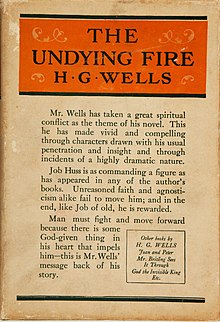
The Book of Job addresses the problem of theodicy, meaning the vindication of the justice of God in the light of humanity's suffering. A rich theological work setting out a variety of perspectives, it has been widely and extravagantly praised for its literary qualities, with Alfred Lord Tennyson calling it "the greatest poem of ancient and modern times". It is found in the Ketuvim ("Writings") section of the Hebrew Bible (Tanakh), and is the first poetic book in the Old Testament of the Christian Bible.
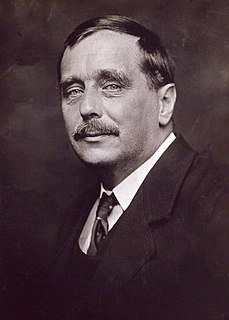
Herbert George Wells was an English writer. Prolific in many genres, he wrote dozens of novels, short stories, and works of social commentary, history, satire, biography and autobiography. His work also included two books on recreational war games. Wells is now best remembered for his science fiction novels and is often called the "father of science fiction", along with Jules Verne and the publisher Hugo Gernsback.

The Red Badge of Courage is a war novel by American author Stephen Crane (1871–1900). Taking place during the American Civil War, the story is about a young private of the Union Army, Henry Fleming, who flees from the field of battle. Overcome with shame, he longs for a wound, a "red badge of courage," to counteract his cowardice. When his regiment once again faces the enemy, Henry acts as standard-bearer, who carries a flag.
Misotheism is the "hatred of God" or "hatred of the gods". In some varieties of polytheism, it was considered possible to inflict punishment on gods by ceasing to worship them. Thus, Hrafnkell, protagonist of the eponymous Hrafnkels saga set in the 10th century, as his temple to Freyr is burnt and he is enslaved, states that "I think it is folly to have faith in gods", never performing another blót (sacrifice), a position described in the sagas as goðlauss, "godless". Jacob Grimm in his Teutonic Mythology observes that:
It is remarkable that Old Norse legend occasionally mentions certain men who, turning away in utter disgust and doubt from the heathen faith, placed their reliance on their own strength and virtue. Thus in the Sôlar lioð 17 we read of Vêbogi and Râdey á sjálf sig þau trûðu, "in themselves they trusted".

Guy Montag is a fictional character and the protagonist in Ray Bradbury's dystopian novel Fahrenheit 451 (1953). He is depicted living in a futuristic town where he works as a "fireman" whose job is to burn books and the buildings they are found in.
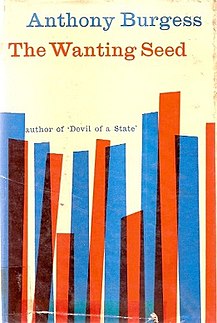
The Wanting Seed is a dystopian novel by the English author Anthony Burgess, written in 1962.

In the Hebrew Bible/Old Testament Book of Job, Zophar the Naamathite is one of the three friends of Job who visits to comfort him during his illness. His comments can be found in Job chapter 11 and 20. He suggests that Job's suffering could be divine punishment, and goes into great detail about the consequences of living a life of sin.
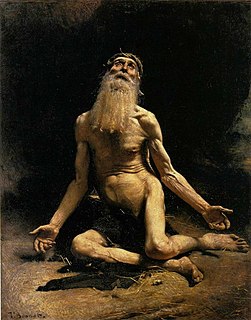
Job is the central figure of the Book of Job in the Bible. In rabbinical literature, Job is called one of the prophets of the Gentiles. In Islam, Job is also considered a prophet.

H. G. Wells' War of the Worlds, also known as Invasion and H. G. Wells' The Worlds in War internationally, or simply as War of the Worlds, is a direct-to-DVD science fiction war film produced by The Asylum and directed by David Michael Latt. It is a loose adaptation of the H. G. Wells 1898 novel The War of the Worlds, and a mockbuster of the DreamWorks/Paramount film based on the same source.

Bildad, the Shuhite, was one of Job's three friends who visited the patriarch in the Hebrew Bible's Book of Job. He was a descendant of Shuah, son of Abraham and Keturah, whose family lived in the deserts of Arabia, or a resident of the district. In speaking with Job, his intent was consolation, but he became an accuser, asking Job what he has done to deserve God's wrath.

Elihu is a man in the Hebrew Bible's Book of Job. He is said to have descended from Guz who may be from the line of Abraham.
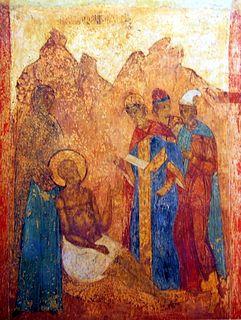
Eliphaz is called a Temanite. He appears in the Book of Job in the Hebrew Bible.
The Trial of God is a play by Elie Wiesel about a fictional trial calling God as the defendant. Though the setting itself is fictional, and the play's notes indicate that it "should be performed as a tragic farce", the events that he based the story on were witnessed first-hand as a teenager in Auschwitz. The play is reimagined for television in God on Trial by Frank Cottrell Boyce.

Mr. Britling Sees It Through is H.G. Wells's "masterpiece of the wartime experience in England." The novel was published in September 1916.
Abba Mari ben Eligdor was a distinguished Talmudist, an eminent philosopher, a member of the Astruc family and an able physicist and astronomer who flourished in the fourteenth century in Salon-de-Provence. In 1335, he was already very old. Of the many writings of Abba Mari, who, according to his contemporary, Isaac de Lattes, wrote commentaries on the Pentateuch, Job, parts of the Talmud, and Pirḳe de-Rabbi Eliezer, as well as works on physics, logic, and metaphysics, merely fragments are extant, and these in manuscript only. His commentary on Job is found in several European libraries; it is not a commentary in an exegetical or historical sense, but is full of philosophical disquisitions upon the Biblical theodicy.

The Research Magnificent is a 1915 novel by H. G. Wells.

Joan and Peter, a 1918 novel by H. G. Wells, is at once a satirical portrait of late-Victorian and Edwardian England, a critique of the English educational system on the eve of World War I, a study of the impact of that war on English society, and a general reflection on the purposes of education. Wells regarded it as "one of the most ambitious" of his novels.
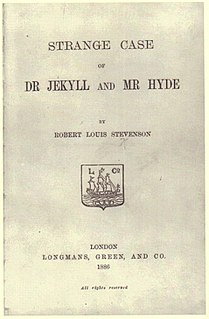
Strange Case of Dr Jekyll and Mr Hyde is a gothic novella by Scottish author Robert Louis Stevenson, first published in 1886. The work is also known as The Strange Case of Jekyll Hyde, Dr Jekyll and Mr Hyde, or simply Jekyll & Hyde. It is about a London legal practitioner named Gabriel John Utterson who investigates strange occurrences between his old friend, Dr Henry Jekyll, and the evil Edward Hyde. The novella's impact is such that it has become a part of the language, with the phrase "Jekyll and Hyde" entering the vernacular to refer to people with an unpredictably dual nature: outwardly good, but sometimes shockingly evil.

The Saga of Tanya the Evil, known in Japan as Yōjo Senki, is a Japanese light novel series written by Carlo Zen and illustrated by Shinobu Shinotsuki. It began serialization online in 2012 on the user-generated novel publishing website Arcadia. Enterbrain acquired the series and since then has published nine volumes since October 31, 2013. A manga adaptation with art by Chika Tōjō began serialization in Kadokawa Shoten's Comp Ace magazine from April 26, 2016. An anime television series adaptation by NUT aired from January 6, 2017 to March 31, 2017. A theatrical film taking place after the events of the TV anime series premiered on February 8, 2019.
